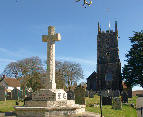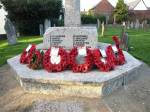On 7th August 1914, three days after the declaration of war and British mobilisation, Lord Kitchener was appointed Minister of War in Asquith’s Liberal government. It was a hazardous experiment, by no means destined for success. Kitchener was a Field Marshall, every inch a Tory, with no ministerial or political experience and with a profound inability to communicate orally with his colleagues. He immediately announced to everyone’s disbelief that it was likely that the war would last three years. With the enthusiastic support of the British people, vital for sustaining war in a democracy, Kitchener also announced the creation of the ‘New Army’, to consist in the first instance of 500,000 men to be trained as infantry, but with an army backed with artillery, engineers and all necessary support. Poster propaganda, including of course the famous portrait of Kitchener himself, became the catalyst for enlistment. Hundreds volunteered immediately, many seeking fun, companionship and adventure to brighten and expand routine and dull lives, some came under pressure from employers or their friends and joined a little later, and in the early days of 1914 and 1915 this was all that was needed. It is incredible to think that the early battles in the Ypres salient, and the battles of Loos and of the Somme were fought almost exclusively by the old regular army, the volunteers that had joined their existing units and regiments, the volunteers of the New Armies (arriving in France by September 1915) and of course the Territorials. It was only once the popular enthusiasm had abated, in view of the appalling casualty lists and with a growing awareness that in spite of their sacrifices Britain and France were certainly not winning the war, that conscription had to be introduced in January 1916.
So great was the initial enthusiasm however that within the first five months of Kitchener’s appeal 1,186,000 men had flocked to join the colours. K1 (the first 500,000), K2 (the second 500,000) were already full and K3 was being assembled. In the end there was even a K4, formed early in 1915. Then came Second Ypres, Neuve Chapel, Festubert and Aubers Ridge and enthusiasm died away. After the catastrophe of Loos in September 1915 it could not be revived.
There were many in Britain in August 1914 who did not believe that armies could be conjured in this way, apparently out of nothing. In Germany there was total disbelief. Their conscript army of over four million men had trained for years, were mostly superbly equipped, with long-standing and experienced NCOs and a superior Officer Class, brought up on the expectation of war with England. This is an example of the reaction to Kitchener’s call to arms as reported by ‘The Times’ immediately following August 7th 1914. The article is headed
Translation of an article by Herr Erzaberger, published in ‘Germania’ in August 1914 on the British war effort. I quote the following delectable passages from Herr Erzaberger’s article:
The new British Minister of War, Kitchener - he who so well understood swinging the whip over the Viceroy in Cairo, and who has undertaken the office of Dictator in Paris - begins his new career as Minister of War in London famously. He has asked to be given at one stroke half a million soldiers, and Parliament has consented. Bravo! If this performance does not impress the French and Russians, nothing ever will. So the great secret, which was whispered in Paris as all-important, is now out. Here in Germany we coolly ask ‘Why only half a million? Why not a whole million at once?’ That would be much wiser. Every child in a military family here will know that this new English law is one of the most wholesale swindles of the 20th century, and it is only the stupidity of the allies which permits them to be so tricked. Germany will be enchanted when this half-million advances against us. We will put some old military man, so decrepit that he can hardly sit his horse, in command of the squadron of semi-invalids and he will soon capture these English and turn them over to a Barnum to be shown at fairs as the latest wonder of the world! Those of our men who are first badly wounded in this war must be put in this squadron and given the first chance. It is with undisguised merriment that everyone in Germany reads of this new English vote of Parliament, and we have the right to be amused! Half a million soldiers!! Do they realize in London the absurdity of this grant? Is it possible there is no-one there who knows the cost of this enormous preparation that is needed to equip and train a force of 500,000 men? Do the English imagine that all that is required is to borrow boots in Paris, gunpowder in France, clothes in Russia and Officers in Serbia? Has England then fallen so low that she can jest in this serious hour? For with the best will in the world we can consider anything else incredible. Half a million soldiers require half a million rifles, 50 times that many cartridges and half a million coats, trousers and knapsacks. Where in England to get all these? And the new paper army requires at least 500 new barracks, rifle ranges, drill grounds etc. and were it possible to conjure up all these things overnight, where could the recruits’ instructors be found? Where are the necessary 20,000 officers and 60,000 non-commissioned officers? We could ask a legion of questions on this new English statute did we not know it is not worth the paper on which it is written.
Source: Devon Record Office, private papers of Earl Fortescue, Lord Lieutenant of Devon)
This German attempt at ‘humour’ was not entirely incorrect. The vast influx of men swamped all existing facilities, resources and reserves of clothing and equipment. The men lacked uniforms, they drilled with wooden poles, they were billeted under canvas, in worn out barracks, in makeshift camps and in private homes. Standards of health care were in many cases rudimentary - and we have two examples in Winkleigh of deaths within a matter of days of enlisting, Private Vanstone (died 21.10.1914) and Private Stapleton (died 31.10.1914) both of whom served in the 1st/6th Territorial Battalion of the Devons. Creating the New Armies immediately overturned pre-war government policy: the Asquith government had planned for a small expeditionary force to help the French, the Territorials to remain in Britain as a defence against invasion and the Royal Navy to guard the Channel, keep the sea lanes of Empire intact, blockade the German North Sea ports and bring the German navy to battle prior to inflicting on them a crushing defeat. It was the shocking, unbelievable ferocity of the opening months of war, the British stand at Mons, the retreat, the battle of the Marne and First Ypres, and the appalling winter of 1914-15 in the trenches that virtually extinguished the old regular army, a process completed by the Spring and Summer offensives of this second year of the war. Although 2,466,719 volunteers had joined the army by the end of 1915, conscription was the only way forward. Some 5,704,000 served in the British army in the First World War, but it is still astonishing to us today to realize that some half of these were volunteers.
Kitchener had a deep mistrust of politicians, their wives and their mistresses. He was very reluctant to accept the Territorials as anything but ‘a town clerk’s army’ of Saturday soldiers, he distrusted the use of heavy artillery (from his experiences in the Sudan) and above all his autocratic style prevented all communication with his political colleagues and offered opportunities for misunderstandings with his generals. He retained power in his own hands and information only in his own head, but the opening of recent archives now allows us to understand his shrewd military understanding and foresight. Kitchener calculated, astonishingly within the first few days, that the balance of forces would mean a long drawn-out conflict that would inevitably involve colonial disputes and threats to Britain’s vital interests in the Suez Canal, India, Egypt and Mesopotamia. He calculated that at the end of it all and with the assistance of armies from Canada, Australia, New Zealand, South Africa, India and the French colonies, the Allies - France, Britain and Russia - would win, but above all he was determined that the peace that would emerge must be made in the interests of Britain and for the extension of the British Empire. He saw that the Western Front would be the main battle area, with ‘sideshows’ only possible as profitable extras employing local levies backed with colonial troops. Above all it was the Middle East that was his main concern. He often said ‘If we lose Suez we lose the war’. The New Armies, however, he conceived for a special purpose.
Kitchener calculated that after three years of war the main combatants, Germany, France and Russia would have exhausted themselves in fruitless attrition. The British New Army, fully trained and equipped and ready to serve in France would then be in a position to step in and achieve a final victory, thereby allowing Britain to dominate the peace treaty and establish the new world order to its great advantage. This policy, never properly explained or understood by the Cabinet, was of course entirely overthrown by a miscalculation that no-one could have anticipated. The casualties in the French and British armies in the first months of the war necessitated first employing the Territorials overseas, followed almost immediately by using K1 and then K2, half trained and totally inexperienced as they were. To take the example of the New Army battalions of the Devonshire Regiment, the 8th and 9th, is to see that before 1916 was over both battalions had been decimated twice, first at Loos and then on the opening day of the Somme and already had to be re-created for the third time. Kitchener’s logic was faultless. A New Army would indeed step forward in the final year of the war to arbitrate and dominate the peace conference, but it was the United States, without inter-allied commitments and with its army acting independently of the Allies, that would finally dictate the settlement.




